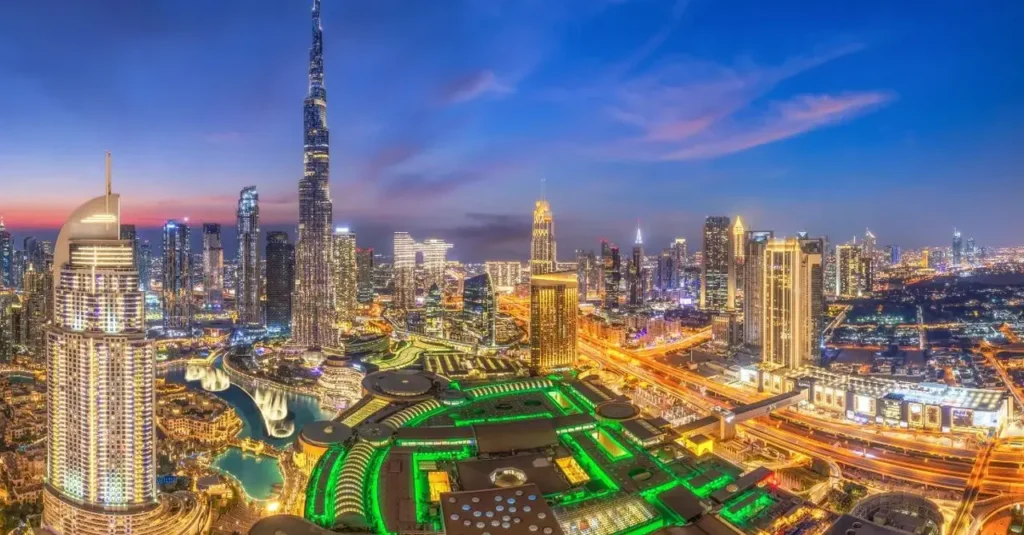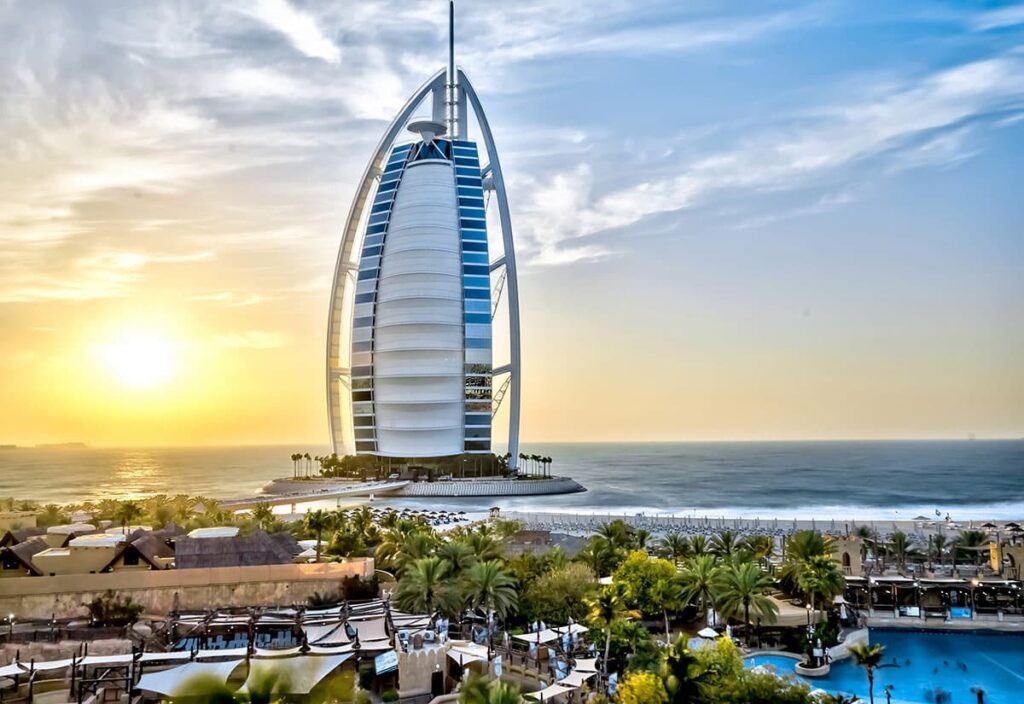Dubai Hotel Revenues are not just recovering; they are rocketing to unprecedented heights. The hospitality sector in the UAE, spearheaded by its most iconic global city, has announced stunning double-digit growth figures for the year, signaling a major transition into a new, mature, and investment-driven phase.
Recent industry reports confirm that the overall UAE hotel sector has witnessed a remarkable jump in key performance indicators. The total revenue across the Emirates’ hospitality sector has surged by approximately 12% in the 12 months leading up to late 2025. This exceptional performance is a direct reflection of Dubai’s unwavering commitment to its strategic tourism vision and its enduring appeal as the world’s most popular travel destination.
While the broader UAE market posted the 12% revenue growth, Dubai itself—the powerhouse of the region’s tourism infrastructure—reported a 10.1% rise in Revenue Per Available Room (RevPAR). RevPAR is the gold standard metric for hotel financial health, and this double-digit increase confirms that the city’s hoteliers are successfully commanding higher prices and filling more rooms, simultaneously. It is a clear sign of a sector that is not merely rebounding from past challenges but establishing a new, robust baseline for future expansion.
The Numbers Behind the Boom: Occupancy, ADR, and Visitor Records
The extraordinary increase in Dubai Hotel Revenues is driven by a flawless alignment of robust international demand and disciplined pricing strategies. The foundational metrics for the hospitality sector paint a picture of unparalleled market strength:
1. Record-Breaking International Arrivals
Dubai’s aggressive, future-focused tourism strategy is translating directly into beds filled.
- The city welcomed a staggering 12.54 million international overnight visitors between January and August 2025.
- This figure represents a healthy 5% year-on-year increase and puts the emirate firmly on track to meet, or even surpass, its ambitious government forecast of 22 million tourist arrivals by the end of the year.
- The city’s allure is global, with significant visitor contributions coming from Western Europe, the MENA/GCC region, Eastern Europe, and South Asia.
2. Soaring Occupancy Rates
High visitor numbers have kept hotel rooms consistently full, despite the continuous addition of new inventory.
- Average hotel occupancy across Dubai for the first half of 2025 climbed above 81%, marking a significant year-on-year improvement.
- Looking at the year-to-date figures to August 2025, the average occupancy rate remains exceptionally strong at around 78.5%. This is a testament to the resilience of the market, which is absorbing a constantly expanding supply of rooms without compromising its operational efficiency.
3. Healthy Average Daily Rates (ADR)
Critically, the revenue jump is not just from volume; it’s from value. The Average Daily Rate (ADR) across the UAE was up by 11.9% over the same period, allowing hotel operators to significantly boost their top-line income. This demonstrates that guests—particularly those in the high-end segments—are willing to pay premium prices for the world-class quality and luxury experiences that Dubai offers.
A Luxury-First Market: The Strategic Focus on Premium Hospitality

A significant factor cementing the long-term upward trajectory of Dubai Hotel Revenues is the deliberate, strategic weighting towards the luxury and upper-upscale segments. Dubai is not competing on mass-market volume; it is reinforcing its position as the ultimate global destination for discerning, high-spending travelers.
The Current Luxury Landscape
The existing hotel inventory in Dubai already reflects this premium positioning:
- Approximately 69% of Dubai’s current hotel rooms are classified in the Luxury, Upper Upscale, or Upscale categories.
- This dominant share ensures that the city’s offerings align with the affluent traveler demographic it actively courts.
The Future Pipeline is Pure Premium
The development pipeline shows an even stronger emphasis on high-end luxury, which promises to sustain high ADRs and continue driving up Dubai Hotel Revenues in the coming years.
- Of all the hotel rooms currently under construction across the UAE, a massive 43% are classified within the luxury segment.
- In Dubai alone, over 12,800 new rooms are in the pipeline, with the majority falling into the premium categories. This includes high-profile openings like the Mandarin Oriental Downtown Dubai and the spectacular Ciel Dubai Marina, which will be among the world’s tallest hotels.
As industry analysts point out, this calculated focus ensures that Dubai remains a leader in luxury travel, attracting affluent visitors who seek not just accommodation but a complete, exclusive lifestyle experience. This high-value tourism influx directly contributes to the city’s economic diversification goals, as high-net-worth individuals spend across retail, fine dining, and entertainment sectors.
The Strategic Pillars: Vision 2040 and D33 Economic Agenda
The robust performance of Dubai Hotel Revenues is not accidental. It is the calculated outcome of major governmental and strategic initiatives designed to future-proof the emirate’s economy. Two key plans provide the framework for sustained growth:
1. The Dubai Economic Agenda (D33)
The D33 strategy aims to double the size of Dubai’s economy within a decade, positioning the city as one of the top three global cities for business and leisure. The hospitality sector is a core pillar of this plan. By focusing on creating world-class attractions, facilitating global trade, and streamlining business and visa processes, D33 directly boosts both corporate and leisure travel, ensuring a consistent and diverse stream of high-spending visitors to the city’s hotels.
2. The Dubai 2040 Urban Master Plan
This long-term urban development strategy is crucial for the hospitality sector’s infrastructure. The plan includes significant upgrades to public transport (like the expansion of the Dubai Metro), the development of new urban centres, and the preservation of natural areas. The enhanced connectivity, exemplified by projects enabling easy access to major event sites, makes the entire city more accessible and attractive to tourists, thereby supporting hotel performance across all neighbourhoods. Furthermore, the plan’s focus on sustainability is integrating eco-conscious design into new hotel developments, appealing to a growing segment of global travelers who prioritize environmental responsibility.
Market Maturity: The Shift from Development to Investment

Beyond the impressive operational figures, the market itself is undergoing a subtle but profound change that indicates long-term stability and maturity.
For many years, the UAE’s hospitality sector was characterized by “development-led expansion”—the constant construction of new, iconic properties. While development continues, industry analysts like Knight Frank note that the market is now entering a more “investment-led phase.”
A Focus on Strategic Acquisitions and Asset Repositioning
This shift means:
- Strategic Acquisitions: Regional and international investors, including large institutional funds and family offices, are increasingly focusing on acquiring existing, well-performing hotels rather than building from the ground up.
- Asset Repositioning: Capital is being channeled into refurbishing, upgrading, and rebranding older, established properties. This allows investors to unlock new value, integrate modern technology (such as AI-driven personalization and automated operations), and align the assets with contemporary luxury trends like wellness and extended-stay models.
- Mixed-Use Developments: There is a growing trend towards integrated hospitality concepts that blend hotels with branded residences and retail components. This diversification of revenue streams enhances financial resilience and provides deeper loyalty ecosystems.
Experts agree that this transition underscores the growing sophistication and depth of the market. According to one industry partner, the flow of capital is now favoring assets that “demonstrate adaptability, whether through tech integration, sustainable operations, or diversified revenue streams.”
Sustaining the Momentum: Events, Gastronomy, and the Global Gateway
The future outlook for Dubai Hotel Revenues remains overwhelmingly positive, underpinned by a calendar of global events and the city’s evolving soft power attractions.
A Global Events Hub
Dubai’s ability to host mega-events continues to be a massive demand driver for hotels. The city’s success in hosting major events (like the upcoming Future Hospitality Summit and its ongoing role as a business convention hub) ensures a consistent influx of high-spending business and MICE (Meetings, Incentives, Conferences, and Exhibitions) travelers.
Culinary Tourism and Gastronomy
The city’s rapidly ascending culinary scene is now a major tourism pillar. The continued growth and recognition from entities like the MICHELIN Guide—which has expanded its coverage and recognized sustainable practices with Green Stars—are attracting a new segment of travelers whose entire trip is centered around gastronomic exploration. This shift enhances the destination’s overall appeal, encouraging longer stays and higher expenditure.
The Global Gateway Effect
With Dubai International Airport (DXB) remaining one of the busiest international airports in the world, the city is geographically positioned for success. Furthermore, the planned long-term expansion of Al Maktoum International Airport (DWC) is expected to hard-wire the city’s capacity for growth for the next decade, ensuring that the infrastructure can accommodate the 22 million-plus visitor target comfortably.
The confluence of visionary government strategy, a sustained commitment to luxury development, the market’s maturation towards smart investment, and record visitor figures confirms one thing: the 12% jump in hotel revenues is not a peak, but a strong indicator of the sector’s new, elevated trajectory. Dubai is not resting on its laurels; it is actively building the future of global hospitality.
Do Follow Gulf Magazine on Instagram
Also read: Desserts of the UAE: A Blend of Culture and Tradition



